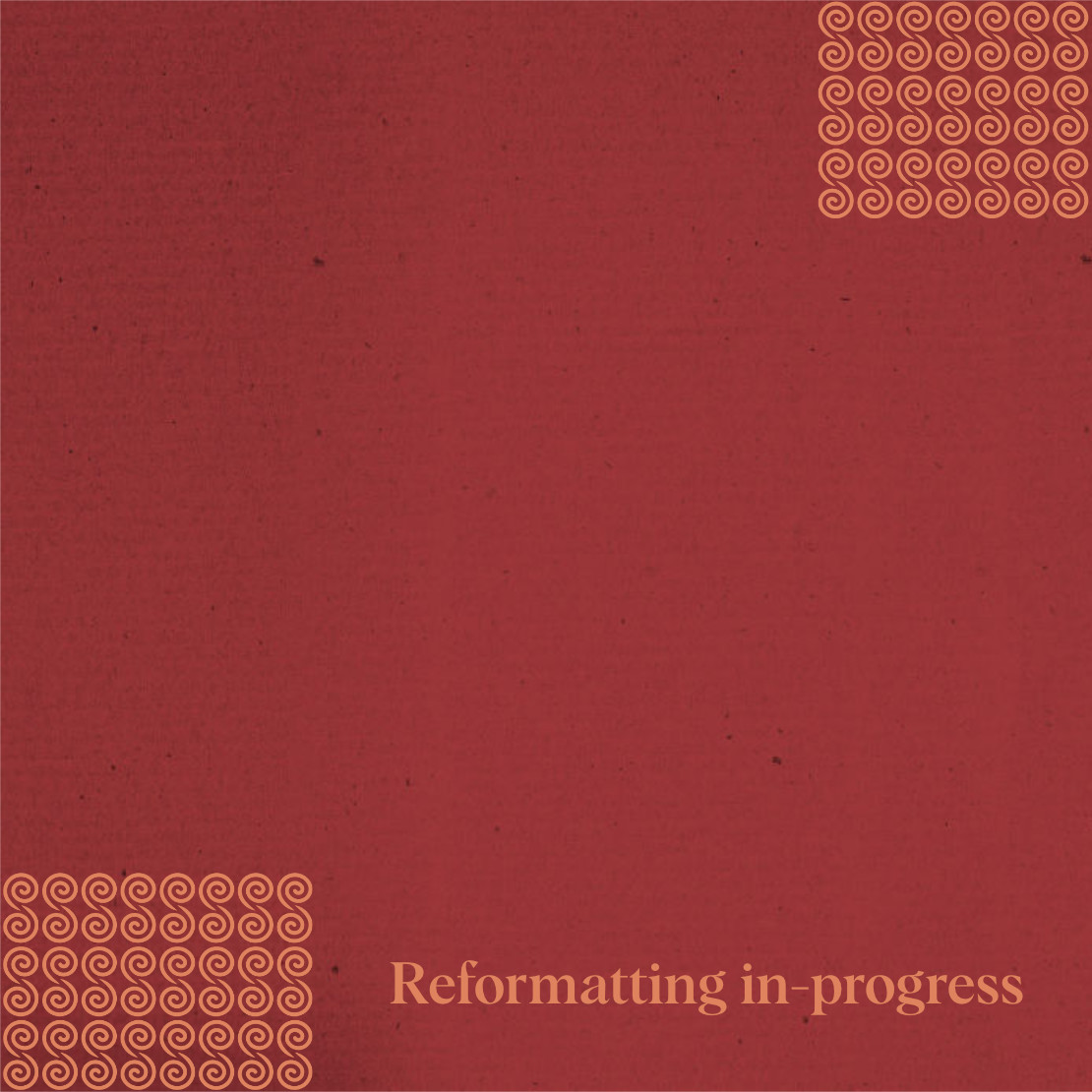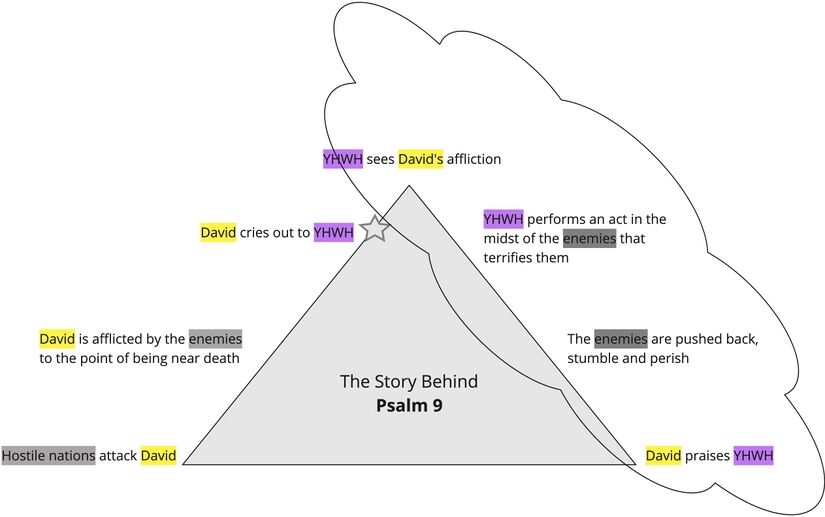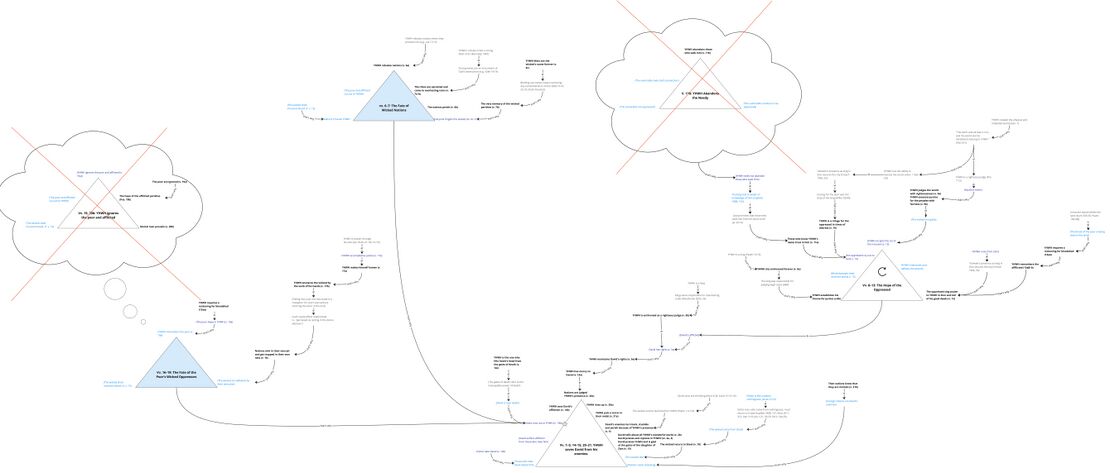Psalm 9 Story Behind
About the Story Behind Layer
The Story Behind the Psalm shows how each part of the psalm fits together into a single coherent whole. Whereas most semantic analysis focuses on discrete parts of a text such as the meaning of a word or phrase, Story Behind the Psalm considers the meaning of larger units of discourse, including the entire psalm.
The goal of this layer is to reconstruct and visualize a mental representation of the text as the earliest hearers/readers might have conceptualized it. We start by identifying the propositional content of each clause in the psalm, and then we identify relevant assumptions implied by each of the propositions. During this process, we also identify and analyze metaphorical language (“imagery”). Finally, we try to see how all of the propositions and assumptions fit together to form a coherent mental representation. The main tool we use for structuring the propositions and assumptions is a story triangle, which visualizes the rise and fall of tension within a semantic unit. Although story triangles are traditionally used to analyze stories in the literary sense of the word, we use them at this layer to analyze “stories” in the cognitive sense of the word—i.e., a story as a sequence of propositions and assumptions that has tension.
Summary Triangle
The story triangle below summarises the story of the whole psalm. We use the same colour scheme as in Participant Analysis. The star icon along the edge of the story-triangle indicates the point of the story in which the psalm itself (as a speech event) takes place. We also include a theme at the bottom of the story. The theme is the main message conveyed by the story-behind.
| Story Triangles legend | |
|---|---|
| Propositional content (verse number) | Propositional content, the base meaning of the clause, is indicated by bold black text. The verse number immediately follows the correlating proposition in black text inside parentheses. |
| Common-ground assumption | Common-ground assumptions[1] are indicated by gray text. |
| Local-ground assumption | Local-ground assumptions[2] are indicated by dark blue text. |
| Playground assumption | Playground assumptions[3] are indicated by light blue text. |
| The point of the story at which the psalm takes place (as a speech event) is indicated by a gray star. | |
| If applicable, the point of the story at which the psalm BEGINS to take place (as a speech event) is indicated with a light gray star. A gray arrow will travel from this star to the point at which the psalm ends, indicated by the darker gray star. | |
| A story that repeats is indicated by a circular arrow. This indicates a sequence of either habitual or iterative events. | |
| A story or event that does not happen or the psalmist does not wish to happen is indicated with a red X over the story triangle. | |
| Connections between propositions and/or assumptions are indicated by black arrows with small text indicating how the ideas are connected. | |
| Note: In the Summary triangle, highlight color scheme follows the colors of participant analysis. | |
Background ideas
Following are the common-ground assumptionsCommon-ground assumptions include information shared by the speaker and hearers. In our analysis, we mainly use this category for Biblical/Ancient Near Eastern background. which are the most helpful for making sense of the psalm.
- YHWH is a king (Psa. 10:16).
- The king was also the one responsible for maintaining order and therefore functioned as a judge (ABD, s.v. 'King and Kingship). Kings in Israel were also responsible for maintaining the rights of the poor and vulnerable (Psa 72; Miller 2004, 192).
- YHWH is also the creator (Gen. 1; Psa 24:1). As creator only he has the power to reverse the social order (1 Sam 2:8; TDOT 15:559).
- Innocent blood defiles God's land, which, since he is king over the earth, includes the whole world. The only thing that can cover innocent blood is the blood of the one who spilled it (Num 35:33).
- The 'gates' of Sheol symbolised death's inescapable power (Hupfeld 1888, 144; ABD s.v. 'Dead, Abode of the'; Psa 9:13; 107:18; 38:17; Isa 38:10; 3 Macc 5:5; Matthew 16:18)
- YHWH makes himself known through his mighty and terrifying acts (v. 17; cf. Isa 19:20–21; 66:13–15).
- Sinful man, who came from nothingness, must return to it (see Huppfeld 1888, 147; Ross 2011, 312; Gen 3:19; Job 1:21; 30;23; 90:3; 104:29).
Background situation
The background situation is the series of events leading up to the time in which the psalm is spoken. These are taken from the story triangle – whatever lies to the left of the star icon.

Expanded Paraphrase
The expanded paraphrase seeks to capture the implicit information within the text and make it explicit for readers today. It is based on the CBC translation and uses italic text to provide the most salient background information, presuppositions, entailments, and inferences.
| Expanded paraphrase legend | |
|---|---|
| Close but Clear (CBC) translation | The CBC, our close but clear translation of the Hebrew, is represented in bold text. |
| Assumptions | Assumptions which provide background information, presuppositions, entailments, and inferences are represented in italics. |
| Text (Hebrew) | Verse | Expanded Paraphrase |
|---|---|---|
| לַ֭מְנַצֵּחַ עַלְמ֥וּת לַבֵּ֗ן מִזְמ֥וֹר לְדָוִֽד׃ | 1 | For the director, according to Muth-labben. A psalm written by David. |
| אוֹדֶ֣ה יְ֭הוָה בְּכָל־לִבִּ֑י אֲ֝סַפְּרָ֗ה כָּל־נִפְלְאוֹתֶֽיךָ׃ | 2 | I will praise YHWH with all my heart; I will tell about all your wonderful works with which you terrify your enemies! |
| אֶשְׂמְחָ֣ה וְאֶעֶלְצָ֣ה בָ֑ךְ אֲזַמְּרָ֖ה שִׁמְךָ֣ עֶלְיֽוֹן׃ | 3 | I will rejoice and exult because of you; I will sing praise to your name, which is revealed through those wonderful works, Most High, |
| בְּשׁוּב־אוֹיְבַ֥י אָח֑וֹר יִכָּשְׁל֥וּ וְ֝יֹאבְד֗וּ מִפָּנֶֽיךָ׃ | 4 | When my enemies who are foreign nations turn back, they stumble and perish because of your terrifying presence, for the wicked cannot stand before you (Psa 1:4; 5:6)! |
| כִּֽי־עָ֭שִׂיתָ מִשְׁפָּטִ֣י וְדִינִ֑י יָשַׁ֥בְתָּ לְ֝כִסֵּ֗א שׁוֹפֵ֥ט צֶֽדֶק׃ | 5 | Because you have maintained my right and my claim that I have because I am unjustly afflicted; you are a king, whose responsibilities include judging and caring for the poor, afflicted and oppressed. You have sat on a throne as a righteous judge. |
| גָּעַ֣רְתָּ ג֭וֹיִם אִבַּ֣דְתָּ רָשָׁ֑ע שְׁמָ֥ם מָ֝חִ֗יתָ לְעוֹלָ֥ם וָעֶֽד׃ | 6 | In the past, when wicked nations attacked as they are attacking now You rebuked nations due to their hostility towards you (cf. Psa 2; Isa 17:13) when they defiled your land with innocent blood; you destroyed the wicked; you blotted out their name forever and ever so that their acts would never again be remembered. |
| הָֽאוֹיֵ֨ב ׀ תַּ֥מּוּ חֳרָב֗וֹת לָ֫נֶ֥צַח וְעָרִ֥ים נָתַ֑שְׁתָּ אָבַ֖ד זִכְרָ֣ם הֵֽמָּה׃ | 7 | The enemy came to an end in ruins forever, and you uprooted cities. The very memory of them perished. |
| וַֽ֭יהוָה לְעוֹלָ֣ם יֵשֵׁ֑ב כּוֹנֵ֖ן לַמִּשְׁפָּ֣ט כִּסְאֽוֹ׃ | 8 | But YHWH unlike the wicked whose memory has perished will sit enthroned forever; he has established his throne for justice, |
| וְה֗וּא יִשְׁפֹּֽט־תֵּבֵ֥ל בְּצֶ֑דֶק יָדִ֥ין לְ֝אֻמִּ֗ים בְּמֵישָׁרִֽים׃ | 9 | and he will judge the world of which he is the creator with righteousness; he will execute justice for the peoples with fairness. |
| וִ֘יהִ֤י יְהוָ֣ה מִשְׂגָּ֣ב לַדָּ֑ךְ מִ֝שְׂגָּ֗ב לְעִתּ֥וֹת בַּצָּרָֽה׃ | 10 | And may YHWH who, being creator, is the only one who has the power to reverse the social order (1 Sam 2:8) be a refuge for the oppressed, a refuge in distressing times. |
| וְיִבְטְח֣וּ בְ֭ךָ יוֹדְעֵ֣י שְׁמֶ֑ךָ כִּ֤י לֹֽא־עָזַ֖בְתָּ דֹרְשֶׁ֣יךָ יְהוָֽה׃ | 11 | And may those who know your name and your promises put their trust in you, because you have not abandoned those who seek you, YHWH, in accordance with your promise that those who seek you find you (Deut 4:29). |
| זַמְּר֗וּ לַ֭יהוָה יֹשֵׁ֣ב צִיּ֑וֹן הַגִּ֥ידוּ בָ֝עַמִּ֗ים עֲלִֽילוֹתָֽיו׃ | 12 | Sing praise to YHWH, who sits enthroned in Zion the place from which YHWH rules because his presence there secures the city and ensures justice as was the responsibility of the king Tell about his deeds among the peoples, |
| כִּֽי־דֹרֵ֣שׁ דָּ֭מִים אוֹתָ֣ם זָכָ֑ר לֹֽא־שָׁ֝כַ֗ח צַעֲקַ֥ת עֲנָוִֽים׃ | 13 | because the one who requires a reckoning for bloodshed remembered them since bloodshed pollutes his land; he has not ignored the outcry of the poor whose innocent blood is spilled at the hands of the wicked. |
| חָֽנְנֵ֬נִי יְהוָ֗ה רְאֵ֣ה עָ֭נְיִי מִשֹּׂנְאָ֑י מְ֝רוֹמְמִ֗י מִשַּׁ֥עֲרֵי מָֽוֶת׃ | 14 | I am among those who are afflicted yet innocent! Have mercy on me, YHWH! Since you have destroyed wicked nations before See my affliction from those foreign enemies who hate me, you who lifts my head from the gates of death who saves me from deaths inescapable power. I am near death at the hands of my enemies and so I am asking you to save me! |
| לְמַ֥עַן אֲסַפְּרָ֗ה כָּֽל־תְּהִלָּ֫תֶ֥יךָ בְּשַֽׁעֲרֵ֥י בַת־צִיּ֑וֹן אָ֝גִ֗ילָה בִּישׁוּעָתֶֽךָ׃ | 15 | so that I may tell about all your praiseworthy actions not at the gates of death, but at the gates of daughter Zion among your holy people in the city over which you rule, (and so that) I may be glad because of your salvation! |
| טָבְע֣וּ ג֭וֹיִם בְּשַׁ֣חַת עָשׂ֑וּ בְּרֶֽשֶׁת־ז֥וּ טָ֝מָ֗נוּ נִלְכְּדָ֥ה רַגְלָֽם׃ | 16 | Previous nations defiled your world by spilling innocent blood and oppressing the poor and afflicted. The only thing that can cover innocent blood is the blood of the one who spilled it (Num. 35:33). Israel had a proverb that illustrated this principle of retribution: Nations sank in a pit which they had made; their foot was caught in a net which they had hidden. |
| נ֤וֹדַ֨ע ׀ יְהוָה֮ מִשְׁפָּ֪ט עָ֫שָׂ֥ה בְּפֹ֣עַל כַּ֭פָּיו נוֹקֵ֣שׁ רָשָׁ֑ע הִגָּי֥וֹן סֶֽלָה׃ | 17 | YHWH, who has accomplished justice, has made himself known through his acts, namely ensnaring the wicked by the work of his hands by which YHWH enacts the principle of retribution. |
| יָשׁ֣וּבוּ רְשָׁעִ֣ים לִשְׁא֑וֹלָה כָּל־גּ֝וֹיִ֗ם שְׁכֵחֵ֥י אֱלֹהִֽים׃ | 18 | All people came from nothingness and sinful, wicked people will return to this nothingness (Gen 3:19; Job 1:21; 30:23; Psa 90:3; 104:29). May the wicked return to Sheol, all nations that ignore God their maker and his path to life. |
| כִּ֤י לֹ֣א לָ֭נֶצַח יִשָּׁכַ֣ח אֶבְי֑וֹן תִּקְוַ֥ת עֲ֝נִיִּ֗ים תֹּאבַ֥ד לָעַֽד׃ | 19 | For the poor will not be ignored forever; the hope of the needy will (not) perish forever. |
| קוּמָ֣ה יְ֭הוָה אַל־יָעֹ֣ז אֱנ֑וֹשׁ יִשָּׁפְט֥וּ ג֝וֹיִ֗ם עַל־פָּנֶֽיךָ׃ | 20 | Rise up, YHWH! Let not mortal man who will return to nothingness prevail; let nations be judged in your presence! |
| שִׁ֘יתָ֤ה יְהוָ֨ה ׀ מוֹרָ֗ה לָ֫הֶ֥ם יֵדְע֥וּ גוֹיִ֑ם אֱנ֖וֹשׁ הֵ֣מָּה סֶּֽלָה׃ | 21 | YHWH you make yourself known through your terrifying acts, put a terrifying thing in their midst; act to save the oppressed before them! let the nations know that they are mortals. |
There are currently no Imagery Tables available for this psalm.
Bibliography
Footnotes
- ↑ Common-ground assumptions include information shared by the speaker and hearers. In our analysis, we mainly use this category for Biblical/ANE background - beliefs and practices that were widespread at this time and place. This is the background information necessary for understanding propositions that do not readily make sense to those who are so far removed from the culture in which the proposition was originally expressed.
- ↑ Local-ground assumptions are those propositions which are necessarily true if the text is true. They include both presuppositions and entailments. Presuppositions are those implicit propositions which are assumed to be true by an explicit proposition. Entailments are those propositions which are necessarily true if a proposition is true.
- ↑ Whereas local-ground assumptions are inferences which are necessarily true if the text is true, play-ground assumptions are those inferences which might be true if the text is true.








